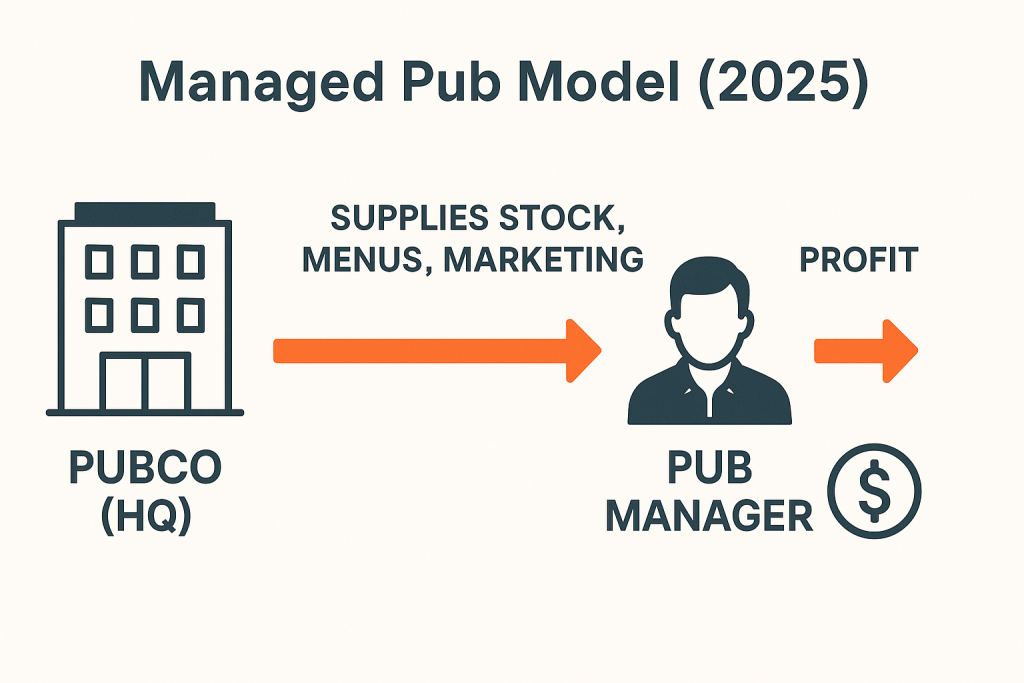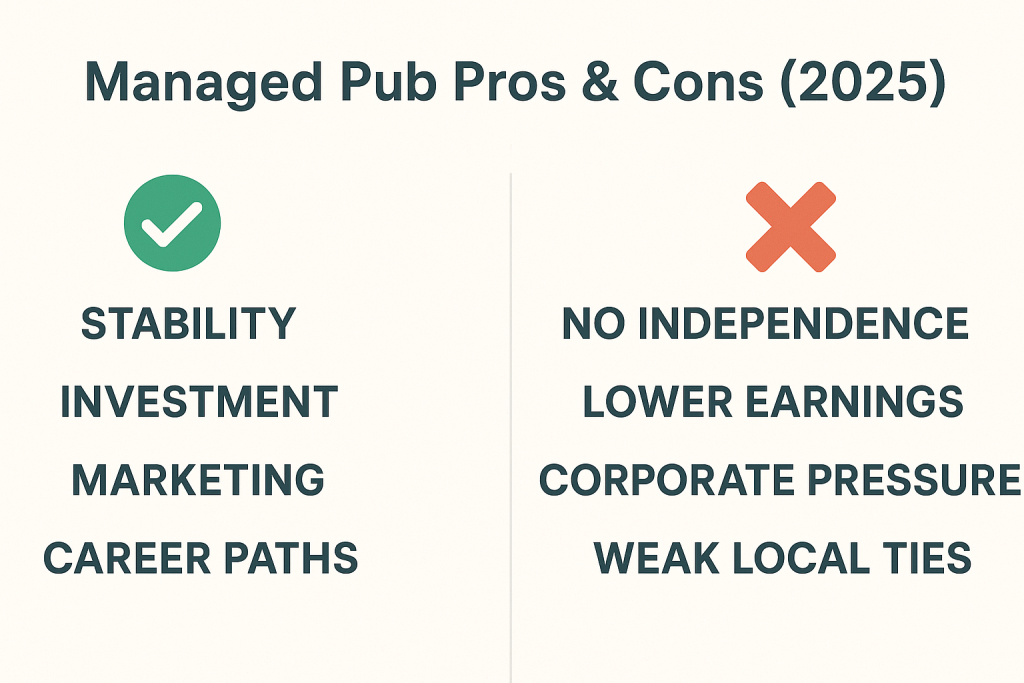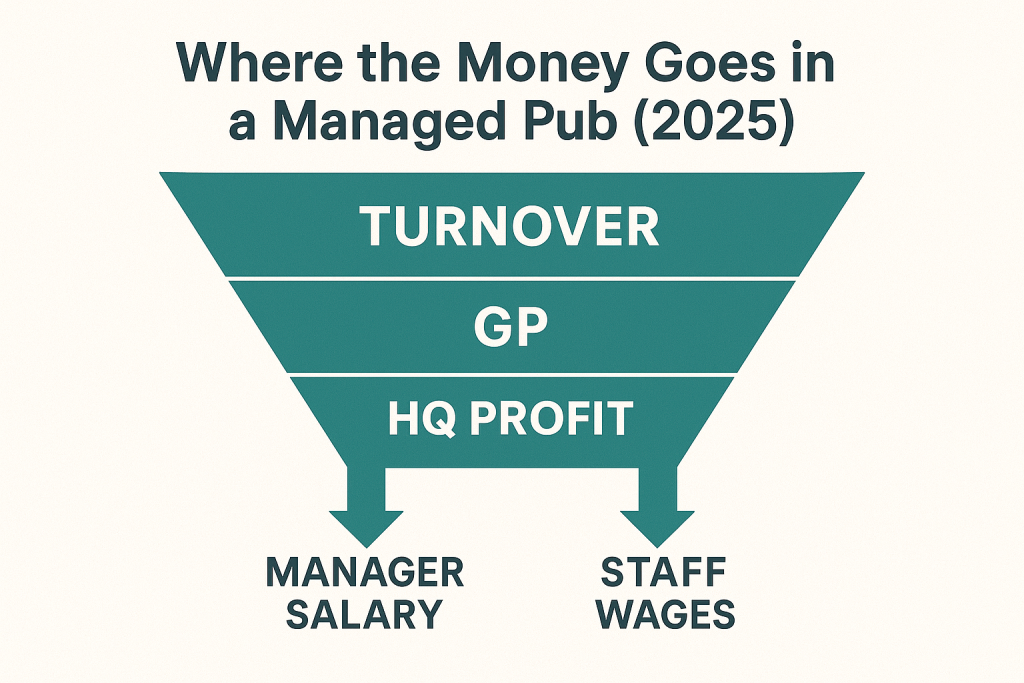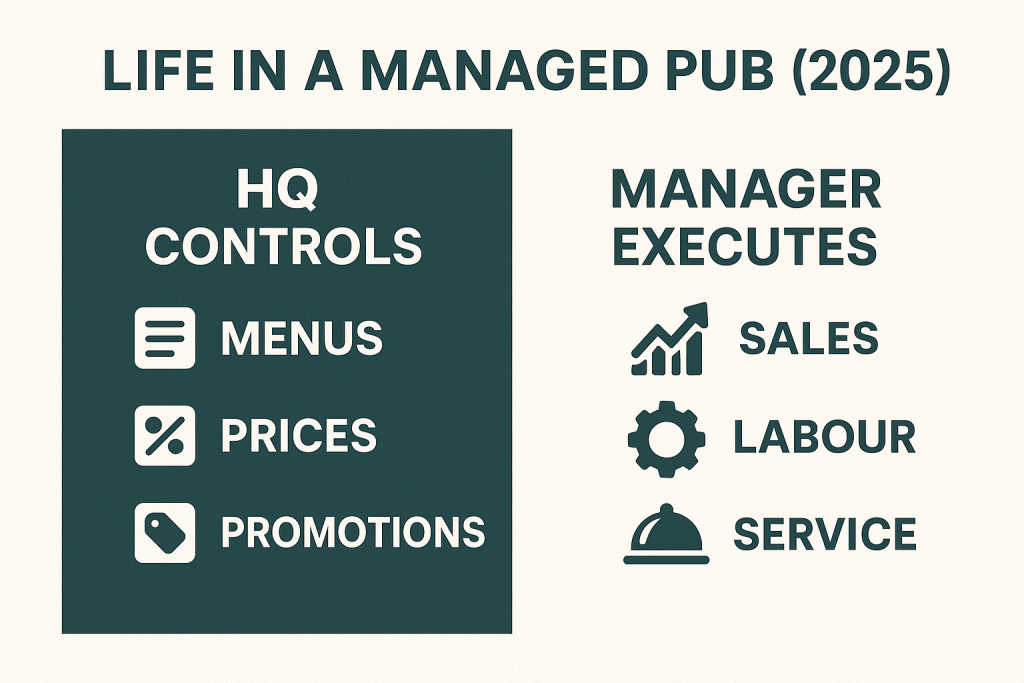What Are Managed Pubs, and Why Do They Matter?
Defining Managed Pubs
A managed pub is one that’s run directly by a brewery or pub company, not by an independent landlord or tenant.
- The pub company employs the manager and staff.
- Stock, menus, events, and marketing are centrally controlled.
- Profit goes back to the pub company, not a tenant or freeholder.
👉 If tenancies are “renting,” and freeholds are “owning,” then managed pubs are “working for the company.”
The Managed Model in 2025
- Around 30% of UK pubs are managed houses (BBPA 2024).
- Dominated by big pubcos: Stonegate, Greene King, Mitchells & Butlers.
- Growing in city centres and high-footfall areas, where chains can standardise offers.
- Declining in rural areas, where local knowledge matters more.
Why Pubcos Love Managed Houses
- Control → They keep branding consistent across locations.
- Efficiency → Centralised supply chains and menus cut costs.
- Flexibility → Easier to pivot concepts (craft beer bars, sports pubs, gastropubs).
- Direct profit → No middleman landlord taking a cut.
Why Customers Like Them
- Consistency → Same beer, food, and deals across multiple pubs.
- Value offers → 2-for-1 meals, cheap pints, loyalty apps.
- Modern refurbishments → Corporate investment keeps sites fresh.
Why Landlords & Managers Don’t Always Like Them
- No independence → You’re a manager, not an owner.
- Lower personal earnings → Paid a salary, not profits.
- High targets → Pubcos set strict KPIs (weekly sales, labour %).
- Less local flavour → Corporate menus and policies over community quirks.
Case Example: The High Street Managed Pub
The Crown, Manchester (Stonegate)
- Managed house since 2018.
- Runs on central menu, big-screen sport, and late-night licence.
- Staff turnover high due to corporate pressure, but sales strong (£1m+ turnover).
“It feels more like running a retail store than a pub. Everything’s tracked, everything’s KPI-driven.” – Pub manager

The Pros & Cons of Managed Houses
The Advantages of Managed Pubs
1. Stability for Managers
- Managers are salaried employees, not entrepreneurs.
- Predictable pay, holiday entitlement, and HR support.
- Safer entry into the trade for those without capital.
2. Investment in Sites
- Pubcos invest millions in refurbishments for managed estates.
- New tech (apps, ordering systems, kitchen equipment) often first rolled out in managed houses.
- Consistent brand standards keep pubs looking fresh.
3. National Marketing Muscle
- Centralised campaigns: e.g., Greene King’s sports promotions or M&B’s 2-for-1 meals.
- Access to loyalty apps, national discounts, and corporate event booking systems.
- Managers benefit from corporate advertising without spending their own money.
4. Training & Career Pathways
- Pub managers get structured training, progression routes, and career security.
- Easier to move between sites or brands within the same pubco.
The Disadvantages of Managed Pubs
1. Lack of Independence
- No say in suppliers, menus, or pricing.
- Local preferences often ignored in favour of corporate standardisation.
2. Lower Earning Potential
- Pub managers earn salaries (£28k–£45k typical), not profits.
- Big turnovers, but the money flows to HQ, not the individual.
3. High Pressure, High Targets
- KPIs (sales, labour %, food GP%) monitored weekly.
- Pressure to meet corporate standards, often at expense of creativity.
4. Disconnect from Local Communities
- Residents often see managed pubs as “chain pubs” rather than locals.
- Struggles in villages or small towns where individuality matters.
The 2025 Reality
Managed pubs dominate city centres and high streets because:
- High turnover makes corporate control worthwhile.
- Customers value cheap deals, consistency, and entertainment.
But they rarely thrive in rural villages where:
- Locals value independence.
- Community pubs and freeholds offer better connection.
Case Example: The Urban Winner vs The Village Loser
The Red Lion, Birmingham (Managed)
- Part of a national brand.
- Turnover £1.2m/year, strong sports + student trade.
- Customers accept “corporate feel” for cheap drinks.
The White Horse, Wiltshire (Managed)
- Converted from tenancy in 2021.
- Locals abandoned it due to loss of individuality.
- Closed in 2024, later reopened as a community pub.
“Managed houses work in cities. In villages, they feel like outsiders.” – Pub consultant

✅ CTA: Managed or independent, pubs only thrive with punters through the door. SmartPubTools.net helps fill tables and boost events with AI-powered marketing.
Financials — Salaries, Turnover & Where the Money Goes
How Managed Pubs Make Money
In managed houses, the pubco owns the pub and the profits. The pub is essentially a branch of a bigger chain.
- The pub manager runs the site.
- Staff are employed directly by the pubco.
- All takings flow to HQ, which covers wages, stock, and overheads.
👉 Unlike tenancies or leases, managers don’t keep profits — they get a salary.
Pub Manager Salaries in 2025
- Small managed houses: £28k–£35k/year.
- Busy city-centre pubs: £40k–£50k/year.
- Multi-site area managers: £55k–£70k+.
Many managers also get:
- Bonus schemes (based on hitting sales/labour targets).
- Accommodation (live-in pubs save £8k–£12k/year in rent).
Turnover Figures
- Urban managed pubs: £750k–£1.5m annual turnover.
- Rural managed pubs: £400k–£800k annual turnover.
- Flagship city pubs: £2m+ turnover.
👉 High revenues — but they belong to the pubco, not the manager.
Profit Margins
- Wet-led chains aim for 65–70% GP.
- Food-led chains target 60–65% GP.
- Labour costs capped at 25–30% of turnover.
HQ tracks all KPIs weekly via EPOS systems.
Where the Money Goes
- Pubco HQ → takes profit and reinvests into refurb, marketing, dividends.
- Managers → receive salary + small bonus.
- Staff → paid hourly, typically at or slightly above minimum wage (£11.44+ in early 2025).
Case Example: High Turnover, Low Take-Home
The King’s Arms, Leeds (Managed)
- Turnover: £1.1m/year.
- GP: 68% (~£750k).
- Labour: £280k.
- Rent/overheads covered centrally.
- Net profit to pubco: ~£200k.
- Manager salary: £42k + £3k bonus.
“I ran a million-pound pub, but took home £45k. The numbers are huge, but they’re not yours.” – Pub Manager, Leeds
The 2025 Reality
- Managed pubs = big business, small personal reward.
- Great for stability and career growth.
- Limited appeal to entrepreneurs who want ownership or equity.

✅ CTA: Managed pubs thrive on volume. SmartPubTools helps drive punters in with AI-powered event marketing and local promotions.
SmartPubTools.net
Operations — Life Inside a Managed House
The Day-to-Day Reality
Running a managed pub in 2025 feels very different from running a tenancy or freehold. Managers are employees first, entrepreneurs second.
- HQ sets the menus, pricing, and promotions.
- Managers focus on executing — hitting sales targets, labour efficiency, and service standards.
- Weekly reports feed into regional managers, who oversee performance.
👉 It’s pub management in a corporate wrapper.
Key Performance Indicators (KPIs)
Managed pub managers live and die by KPIs. Common targets include:
- Weekly turnover (vs forecast).
- Labour % of sales (keep under 30%).
- Food GP % (ingredient costs tracked weekly).
- Mystery shopper scores (service quality).
- Health & safety compliance (fire, hygiene, allergen).
HQ uses EPOS data to track everything in real time.
Advantages of Centralised Operations
- Support systems → payroll, HR, stock ordering, marketing all handled centrally.
- Bulk buying power → cheaper supplies, standardised recipes.
- Marketing clout → national ad campaigns and seasonal promotions.
Managers don’t waste time chasing suppliers or building menus — but they also don’t get much freedom.
Challenges for Managers
- Micromanagement → targets often leave little room for creativity.
- Staffing pressure → rota decisions are tightly monitored by HQ.
- Customer pushback → locals sometimes resist “corporate pubs” with cookie-cutter offers.
- Burnout → long hours, strict oversight, and bonus pressure can wear managers down.
“I felt like a supermarket manager in a pub. We hit numbers, but lost the heart of the place.” – Former managed house manager
Managed vs Independent Operations
- Managed: Corporate playbook, KPIs, national promotions.
- Independent (tenancy/freehold): Local freedom, higher admin load, more risk.
Both have pros and cons. The managed model trades freedom for security.
Case Example: The KPI Pub
The Sportsman, Nottingham (Managed)
- Weekly target: £25k turnover.
- Labour budget: £6k (24%).
- Bonus paid only if GP % above 65.
- Missed target = no bonus.
Manager reported feeling “more like an accountant than a landlord.”

✅ CTA: Managed pubs run on systems. SmartPubTools adds the spark — with AI-powered marketing that brings in punters and boosts events.
SmartPubTools.net
The Verdict & FAQs
Who Managed Pubs Suit
Managed houses aren’t for everyone. They’re best for:
- Career-focused managers → hospitality pros who want salary security and progression.
- First-time entrants → people who want pub experience without the financial risk of tenancy/lease.
- City-centre operators → where scale, promotions, and brand consistency win.
👉 They’re not for entrepreneurial types chasing independence or long-term equity.
Who They Don’t Suit
- Entrepreneurs who want control over suppliers, menus, and events.
- Community-focused landlords who thrive on local individuality.
- Risk-takers chasing six-figure profits — managed houses won’t offer that upside.
FAQs
Q: How much do managed pub managers earn?
👉 £28k–£45k typical. Bonuses and live-in accommodation can push this higher.
Q: Do managers share in pub profits?
👉 No. Profits go to HQ. Managers get salaries and bonuses.
Q: Can you move from managed to tenancy/freehold?
👉 Yes — many managers use it as a stepping stone into independent landlording.
Q: Why do pubcos keep so many managed houses?
👉 Profit control, brand consistency, and ability to roll out new concepts quickly.
Q: Do managed pubs still need marketing?
👉 Yes. HQ runs national campaigns, but local-level promotion (events, sports nights, socials) is still vital.
The 2025 Verdict
- Managed pubs = corporate stability. They provide steady pay, structure, and national marketing support.
- Independent pubs = entrepreneurial gamble. More risk, more freedom, more potential reward.
👉 If you want to own, managed pubs aren’t for you. But if you want a stable hospitality career without the financial risk, managed houses remain a strong option.
“I don’t own the pub, but I own my career. Managed pubs gave me stability in an industry that’s anything but stable.” – Managed pub manager, London
The Final Word
Managed houses are the corporate engine of UK pubcos. They dominate the high street, deliver consistent returns for pubcos, and provide thousands of stable jobs.
But they’re not the model for every landlord. If your dream is independence, a managed house won’t scratch the itch.
Managed, leased, or community-owned — every pub needs punters. SmartPubTools.net drives footfall with AI-powered marketing that fills your pub night after night.